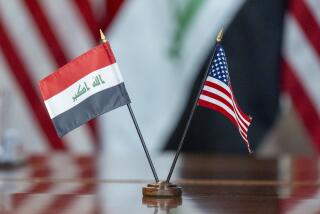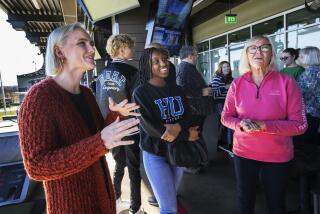U.S. seeks answers after Afghanistan bombing that killed 7 CIA operatives
- Share via
Reporting from Washington and Rochester, N.Y. — The suicide bombing that killed seven CIA employees at a U.S. base will temporarily slow U.S. intelligence-gathering in eastern Afghanistan, but the agency will not retrench its ambitious buildup in the country while it conducts a security review, officials said Thursday.
Military and intelligence officials were scrambling to determine how the bomber penetrated a forbidding network of barriers, barbed wire and watchtowers at Forward Operating Base Chapman in Khowst province near the Pakistani border, and made his way deep inside to set off a thunderous blast.
Western officials were deeply concerned that the assailant had insider’s knowledge of the base layout and security practices, according to an official familiar with the investigation. Some reports said that the attacker was wearing a uniform of the Afghan National Army and carried an identification card, and that officials were trying to determine whether the uniform was stolen or the ID card fake.
“Does this mean we have a guy who went postal?” asked one U.S. official, who spoke on condition of anonymity. “Or is there any element within the ANA that is extremist?”
Other reports suggested that the bomber may have been brought onto the base by CIA operatives who wanted to turn the Afghan into an informer.
U.S. officials said they believed a Taliban claim of responsibility for the attack was legitimate.
Afghanistan’s Ministry of Defense vigorously denied that the suicide bomber was an Afghan soldier. But the allegation clearly stung, because there have been several recent instances in which members of the Afghan security forces turned guns on their Western mentors.
Intelligence operations at the base target extremist groups, including Al Qaeda, the network of Jalaluddin Haqqani, and other militants aligned with the Taliban, officials said. Both Afghan and Pakistani Taliban fighters find refuge in the adjacent tribal areas of Pakistan.
Officials declined to provide a more detailed account of the work, but one senior U.S. official said the attack would have a short-term effect on intelligence-gathering in eastern Afghanistan.
Current and former U.S. intelligence officials said the agency would conduct an assessment to determine how security procedures at the base broke down. But officials said that the agency would not suspend operations in Afghanistan for the review.
“There’s no talk -- none -- of retrenching or slowing the pace of CIA activities,” said a U.S. intelligence official. “There are plenty of people ready, able, and in place to pursue the fight. The atmosphere at Langley is one of even greater focus and determination. The place is galvanized.”
The CIA has been building up its presence in far-flung parts of Afghanistan, particularly in areas such as Khowst, to gather intelligence as the military prepares to add 30,000 U.S. troops, bringing the total to about 100,000. Officials said in the fall that the CIA was deploying spies, analysts and paramilitary operatives, and that the agency’s station in Afghanistan would become one of the largest in agency history.
Officials initially reported that eight CIA employees had been killed in the attack Wednesday. But CIA Director Leon E. Panetta, in a note to the agency workforce Thursday, said seven had died and six were wounded.
“Those who fell yesterday were far from home and close to the enemy, doing the hard work that must be done to protect our country from terrorism,” he said.
The attack is the deadliest for the CIA since the bombing of the U.S. Embassy in Beirut in 1983, in which eight operatives reportedly were killed.
Current and former U.S. officials said that two or three were contractors working for the CIA, and that the rest were career agency employees.
Among those killed was a woman who served as chief of the CIA base near Khowst, and was a longtime officer in the CIA’s Counter-Terrorism Center, according to agency veterans. Her name was not disclosed.
Former CIA officials said that some of those killed worked for the CIA’s paramilitary branch, known as the Special Activities Division.
One official said that by casting suspicion on the Afghan National Army, perpetrators were trying to drive a wedge between U.S. intelligence personnel and Afghans.
The director of military intelligence in Afghanistan, Army Maj. Gen. Michael T. Flynn, has been pushing for greater information sharing and cooperation. Military officials said plans to hire Afghans to guard U.S. forward operating bases would not be canceled. Under that program, which is beginning in eastern Afghanistan, Afghans will guard towers, patrol perimeter fences and man checkpoints.
Military officials say hiring Afghans won’t just allow coalition forces to put more troops in the field, it will also improve ties, provide jobs and build trust with local tribes, helping erode support for the Taliban.
The disclosure that the base was home to a major CIA presence was disconcerting to some Afghan officials who work closely with the civilian reconstruction and development officials also based at Chapman.
“We were surprised to hear the CIA are there,” said Gul Jamil, a member of Khowst’s provincial council. “But the most important thing now is how this base was infiltrated despite tight security.”
Afghans living and working near the base, which lies just outside Khowst city, the provincial capital, recounted hearing an extremely loud explosion about 4:30 p.m., as winter darkness was falling.
“We thought at first that it must have been a rocket attack,” said Mohammad Yaqub, the acting provincial police chief. “It’s hard to know how someone could have gotten inside to do this. Even when I need to visit, I am not allowed to bring a car inside the gate.”
Times staff writer Laura King in Kabul, Afghanistan, contributed to this report.
More to Read
Sign up for Essential California
The most important California stories and recommendations in your inbox every morning.
You may occasionally receive promotional content from the Los Angeles Times.










